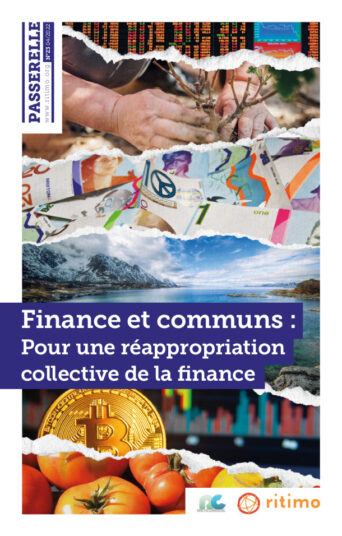
Dossier “Finance and Commons: Towards a Collective Reappropriation of Finance”
Remix biens communs - Wednesday, June 8, 2022Remix the Commons mobilized members of the Finance and Commons discussion list to create the dossier Finance and Commons: Towards a Collective Reappropriation of Finance, the twenty-third issue of the Passerelle collection, published on April 28, 2022, by RITIMO.

Since the 1970s, the financial system has deviated from its original purpose of financing the economy to prioritize the generation of financial profits. However, economists, economic actors, and commoners wonder if it is possible to envision a finance that serves a radically different societal project and what conditions would be necessary for that. The link between finance and commons may seem counterintuitive, but commons represent both a theory and practices of democratic and collective self-management of resources, and thus the economy, allowing for the fulfillment of social needs.
This issue of the Passerelle collection aims to decrypt, analyze, and explain the issues surrounding finance by rethinking it through the lens of commons. The central question that runs through and animates this issue could be summarized as : how can we regain control over financial mechanisms to build this world in common?
First of all, this issue explores the possibility of a collectively managed finance, a “common currency” detached from private banks, and collective debt management. By changing the terms of the debate and playing with scales and the actors involved, valuable insights emerge to initiate a radical change in our economies. The second part of this issue addresses the question of financing commons, drawing on various initiatives such as Community Development Banks in Brazil and models for the sustainability of “common firms”, as well as public-commons partnerships.
Thinking about commons offers a major perspective for rethinking finance and the economy as a whole. This publication aims to contribute to the renovation of our conceptions of the economic and financial system, highlighting the most radical transformation: the self-governance of our world in common.
This issue is based on the contributions of numerous economists, economic actors, and commoners, who are members of the Finance and Commons discussion list led by Roland Perez, David Bourghelle, and Frédéric Sultan.
The table of contents of this special issue is divided into two distinct parts.
Part I: Managing Finance in Common
CURRENCY
- “From suffocating currency to liberating currency” by Denis Dupré
- “The project of a “full currency”” by Jean-Michel Servet
- “Strengths, weaknesses, and prospects of local currencies in France” by Jérôme Blanc and Marie Fare
- “Bitcoin, cryptocurrencies, and commons: a difficult reconciliation?” by Odile Lakomski-Laguerre
- “From monoculture to monetary polyculture: “ecology of currencies” as a new commons” by Christian Arnsperger
DEBT
- “Debt, a fundamental social relationship” by Solène Morvant-Roux
- “Financial interest rates, human disinterest: the role of french private financial institutions in the debt of developing countries” by Oxfam & Dette et Développement
- “COVID Debt: cancelling debt and changing monetary course for a sustainable solution to public debt” by Nicolas Dufrêne and Caroline Weill
- Box : “The debt collective: a union of debtors fighting for the abolition of unfair debts”
ACCOUNTING
- “How is accounting shaped by political and social considerations, and how does it, in return, shape the world?” by Michel Capron
- “Ecological commons vs. Capitalist commons” by Jacques Richard
- “What is the resilience value of commons in the face of climate change?” by Doina Petrescu and Constantin Petcou
- Box : “Valorization accounts and voluntary in-kind contributions in associations” by Emmanuel Charles
Part II: Financing Commons
- “Common ownership and Indigenous resistance: expropriation as an alternative to the “financing” of land recovery” by Lucia Santos
- “Commons in Africa – method of use and local rights” by Stéphanie Leyronas and Lola Mercier
- “Public-Commons partnerships, self-management, and the right to the city” by Bertie Russell and Keir Milburn
- “The strategic role of public financial intermediaries in the face of Energy Transition” by Sandra Rigot and Dominique Plihon
- “Financing commons without harming the common” by Amandine Lebrun and Geneviève Fontaine
- “Democratic and solidarity-based management of commons? Community development banks in Brazil” by Genauto França Filho, Isabelle Guérin, Isabelle Hillenkamp, and Ósia Vasconcelos
- “Sustaining a self-managed experience over time: walking the line between legal and capital independence, surplus redistribution, and investment capacity to preserve the future” by Olivier Laviolette
- “Economic security and socialized investment fund: mutualization commons to finance commons” by Benoît Borrits
- “Metasueños: self-financing digital artivism from the global south through the use of blockchain” by Patricia El and Andrés Burbano Lopez
- Box : “FDNN: How to finance digital commons for a free internet”
All articles from the table of contents of this issue can be freely accessed on the ritimo website : https://www.ritimo.org/Finance-et-communs-Pour-une-reappropriation-collective-de-la-finance-9623
This issue of the Passerelle collection can be downloaded for free from the Coredem website: https://www.coredem.info/rubrique88.html
Print copies of this issue are available for sale on the ritimo website store: https://www.ritimo.org/Finance-et-communs-Pour-une-reappropriation-collective-de-la-finance
